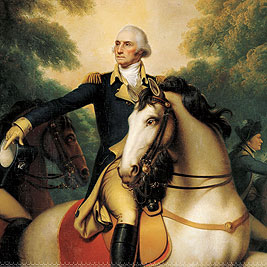

| On February 22, 1732 in the British Commonwealth of Virginia, Mary Ball Washington gave birth to her first son. Although she could not have possibly understood the importance of his birth at the time, his name, George Washington, would someday become synonymous with the founding of the United States of America. Washington's childhood offered few omens of greatness. He was one of ten children (six by Mary Ball and four by George Washington's father's first wife) in an aristocratic Virginian family, bent almost exclusively on growing tobacco and preparing timber. Washington received his primary education at a nearby churchyard school and then was sent to a boarding school 30 miles away. He enjoyed learning about the practical world (how to count one's goods and be a good gentleman farmer), but was not versed in the literary classics of the day, nor did he excel in reading or languages. In Washington's early teens his formal education came to an end. When Washington was 16, he met Lord Thomas Fairfax, an Englishman who owned an enormous tract of land in the northern neck of the colony. Fairfax gave Washington his first job, surveying the lands of the Shenandoah Valley. Through his surveying work, Washington was able to earn enough money to begin buying plots of land. By the age of 21 (now employed as the offical surveyor of the county of Culpeper), he owned more than 1500 acres, all purchased out of his own accounts. In 1752, Washington's older brother Lawrence died, endowing George with care of his Mount Vernon estate and asking him to replace his office as an adjutant general of the colony. His responsibilities included overseeing the militia of the districts. In 1753, Washington successfully carried a British ulimatum to the French in the Ohio River Valley. A year later, he served as a colonel in the French and Indian War. By the late 1700s, the public knew well of Washington's military skill--just at the time the American Revolution was taking shape. In 1775, Washington was appointed military advisor for New York, defending it from British attack. Weeks later, the Second Continental Congress appointed him Commander-in-Chief of the entire military, a position he did not seek and asked not to be paid for. In the beginning, Washington's military maneuvers consisted mainly of sharp correspondence with the British. He lost his first battle, but was overwhelmingly successful in New Jersey. By 1781, with a bedraggled but determined regiment behind him, Washington forced the surrender of Cornwallis at Yorktown. The war was won. Washington's success next brought him the duty of presiding over the Constitutional Convention in 1787. By the time the Constitution was enacted, Washington was elected president, a position he took with reluctance. He served two terms, managing the affairs of a nation in the debt of war, and refused a third term in 1796. Three years later, he died at Mount Vernon of what physicians today say may have been strep throat. The country mourned as it never had before. |
|---|


|

|

|
 |
|---|